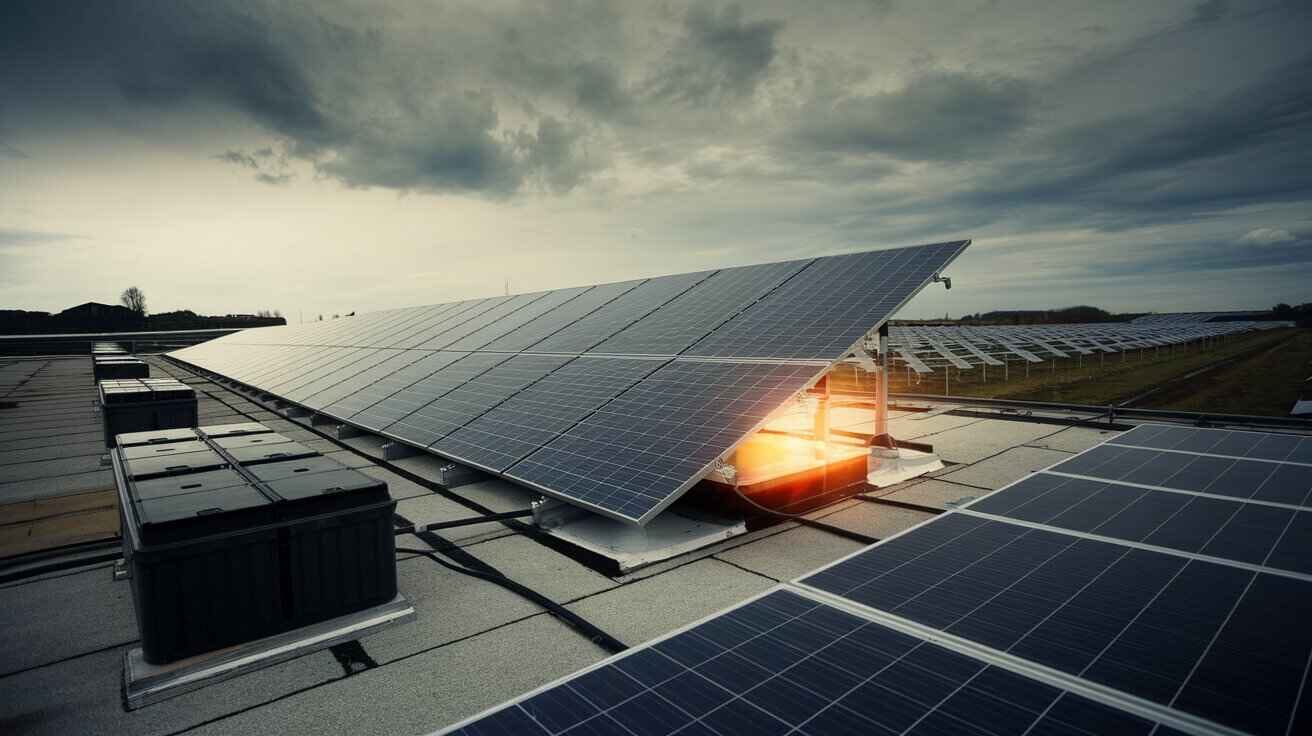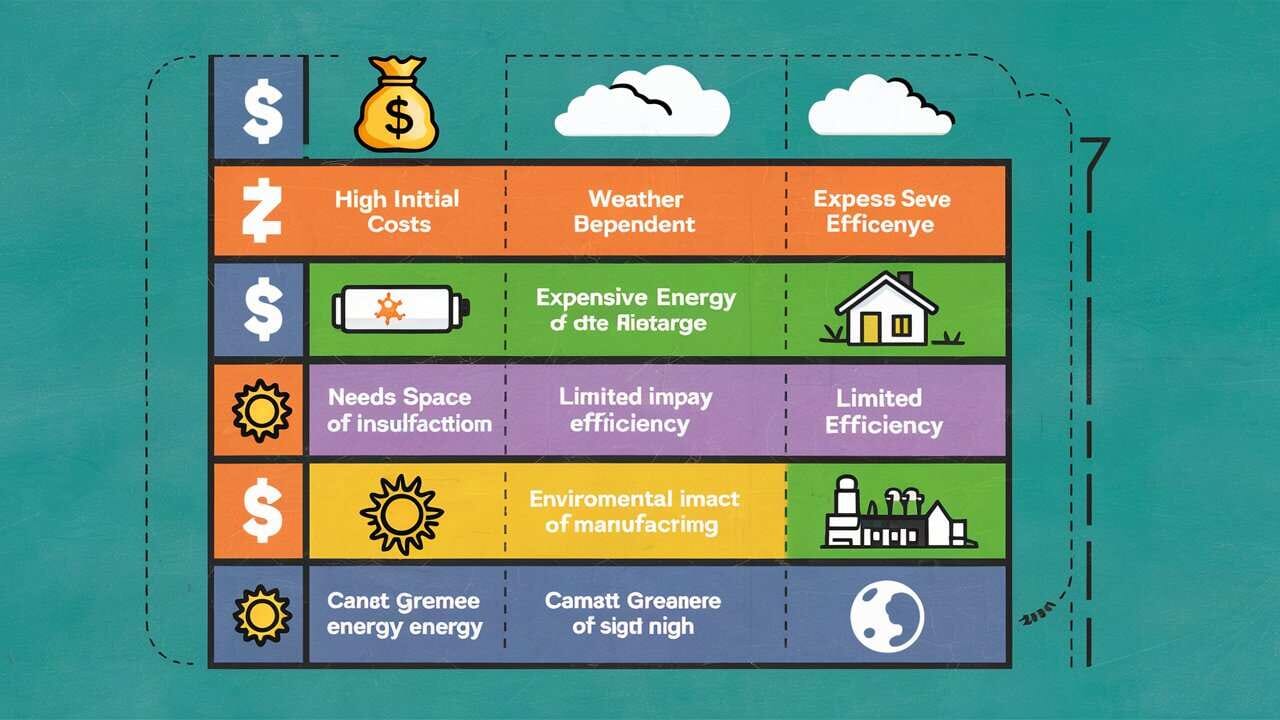
Do you know how we get solar power on Earth? Yes, you guessed right Sun is the most powerful resource for us. We cannot capture a fraction of this energy. By generating solar panels we can make a difference to the planet. Solar panels are widely considered to be a clean and renewable energy source. Solar energy is also used because it can help people reduce electric bills and be environmentally friendly. The downside of solar energy is the same as much of the problem there’s energy but also problems. In this article, we’ll talk about the 7 disadvantages of solar energy so you can understand why this kind of energy isn’t right for everyone. However, renewable energy also has many disadvantages.
Table of Contents
7 Disadvantages of Solar Energy

7 Disadvantages of Solar Energy
High Initial Costs
When the solar panels are highly power-oriented, the most efficient solar systems like beneficial solar panels the initial cost will be high. Both panels and inverters are included, as well as batteries, wiring, and installation. Solar technologies are improving all the time. However, so it is safe to conclude that prices are going to come down in the future. The monocrystalline or black solar panels come with more efficiency, but you’ll also spend more in the UK.
Solar Panel Costs:
The panels are cheaper but it’s still an expensive investment.
Installation Costs:
This means that it will be very expensive in the beginning, as you will end up hiring professionals to implement the system.
Although solar energy is an upfront expense, if you cut your electricity bill by using solar, it’s an investment that can pay off in the long run.
Weather Dependent
One of the most frequently asked questions about the efficiency of solar panels is, for example, the solar panels work in cloudy weather. Solar systems can still collect solar energy, even on cloudy days, but the efficiency of the solar system decreases. Solar energy can collect solar energy only in solar panels when there is the availability of sunlight. This means that a few cloudy rainy days can be felt in the energy system. Also, not only did solar energy not get collected at night, but there was also no supply of energy to your house when you were not during the day. Moreover, you also need to bear in mind that solar energy cannot be collected at night. Big system sizes like a 12kW solar system can not collect solar energy at night, they also can’t change much of the neighboring energy cycle, which is dominated by the grid.
Cloudy Days:
Although solar panels continue to produce electricity even on cloudy days, they provide very few watts.
Winter Months:
Solar power production drops noticeably in long, cold winter regions.
That’s because of the dependence on weather conditions, making solar energy less reliable in places where you don’t get consistent sunlight year round.
Battery Costs:
Costs of solar energy systems increase with the use of such solar batteries, like lithium-ion batteries, which are difficult and expensive to maintain.
Battery Lifespan:
The cost of maintenance is limited battery lifespan and batteries will be changed in a few years.
The challenge of how to store that energy, so it can be used when it’s needed, like at night or when the sun is cloudy, could be difficult for people using solar power systems to generate electricity.
Energy Storage is Expensive
Solar energy has to be used quickly or be stored in oversized batteries. Off-the-grid solar systems use these batteries that can be charged during the day so the energy is used at night. The second solution is being used all day long but it is pricey.
Most of the time it makes more sense to just use the solar energy during the day and draw the energy out of the grid at night (unless your system is only connected to the grid). Fortunately, your energy demand is pretty high during the day so you can typically meet most of it with solar energy.
Battery fees:
Sun batteries like lithium-ion batteries are pricey and increase the fee of the sun power machine.
Battery Lifespan: renovation prices include a limited battery lifespan and substitute of batteries a few years later.
Fixing the venture of the way to shop that electricity so it can be used while wanted, along with at night or for a cloudy day, may want to gift hassle for human beings the use of sun electricity systems to generate power.
Needs Space for Installation.
Solar energy systems are in big demand for space for large-scale installations. The number of solar panels you need to power your home is entirely about the size of your roof (or the surface area of the ground you will install them on).
Roof Size Limitations:
This might not leave you enough room to install a sufficient number of solar panels in homes that have small roofs.
Ground Installations:
Solar panels can't be ground mounted trying to cover large open spaces that some don't have or won't make in urban or densely populated areas.
This means that solar power can be limited by having little space to generate power and without being able to entirely depend on solar power.
Limited Efficiency
Solar panels are not 100 percent efficient. The efficiency of the panels typically falls within 15% to 20% depending upon their type and quality. That means a lot of the sunlight that hits the panels doesn't convert it into electricity.
Energy Loss:
None of the most advanced solar panels can completely harmless the energy that they absorb.
Technological Limitations:
Solar technology has advanced, but the most efficient solar panels can only go so far.
Since solar panels are only as efficient as they are, you need more panels to generate enough electricity to power your home or business.
Solar Panel Manufacturing Impacts the Environment
Though solar energy is a clean energy source, the manufacturing of solar panels has many environmental impacts.
Energy-Intensive Manufacturing:
Producing solar panels is also a lot of energy and some of that energy comes from nonrenewable sources.
Toxic Materials:
The production involves potentially toxic material, such as silicon, but as long as you don’t handle it correctly, you can be hazardous.
Solar energy once installed reduces carbon emissions but the environmental cost of manufacturing the panels cannot be overlooked.
Solar Energy Cannot be Generated at Night.
There isn't always a great deal you can do about this one, however, it's by far one of the most important barriers to solar strength: This electric strength can only be generated whilst the solar is outshining its light at the surface of the earth. Your solar panels do nothing to provide any energy during the nights or cloudy days.
Energy Dependence:
If you no longer have a solar battery device, then you'll be pressured to draw electricity from the grid whenever it's far dark.
Grid Reliance:
Despite those sun panels, most homesteads should still have to hook up to the principal electricity supply to ensure that there may be a consistent delivery of strength at some point in the night.
Appliances and gadgets may be powered with the aid of the grid in the daytime and through the solar for energy at night, or sunshine, best if there is a garage gadget or hyperlink to the grid.
Solar power is a first-rate alternative to conventional electricity assets, but it’s essential to know the 7 disadvantages of solar energy earlier than you move the sun. Although it would bring environmental and monetary benefits, high initial fees, dubious climate dependability, and some different constraints disqualify it for all.
Attempt to think carefully about these elements and evaluate the whole lot in step with your actual desires and situations. Some can be powered using sun energy, however, it’s no longer a one-size-fits-all answer.
| Disadvantages of Solar Energy |
|---|
| High Initial Costs |
| Weather Dependent |
| Energy Storage is Expensive |
| Needs Space for Installation |
| Limited Efficiency |
| Solar Panel Manufacturing Impacts the Environment |
| Solar Energy Cannot be Generated at Night |
